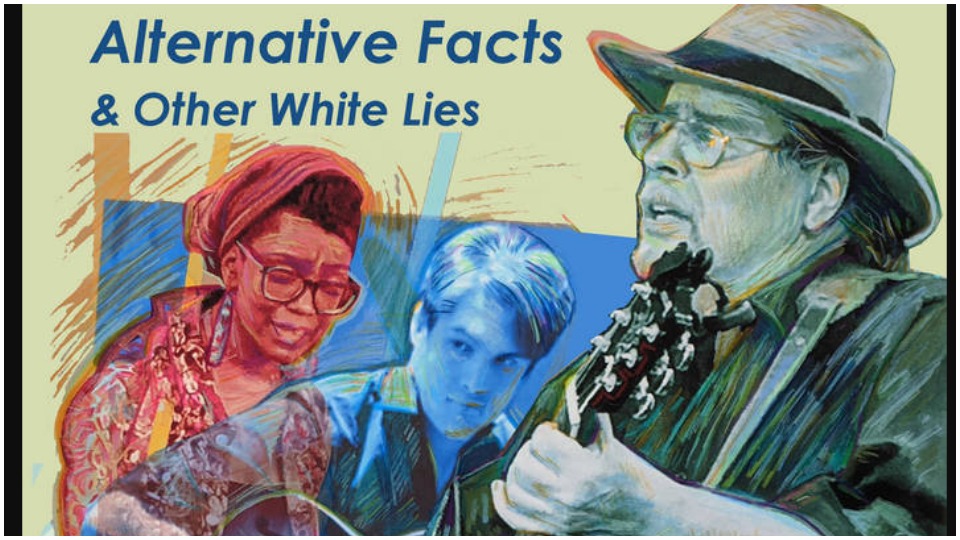
“We all want to be fellow travelers” is not the title of singer-songwriter Mike Glick’s new CD, but his song “Fellow Travelers” kicks off the collection, prefacing and summing up its greater content.
“When this CD was finished,” the New York City-based artist writes, “I realized that it was inspired by the struggles and lives of our musical and other ancestors. They fought racism, anti-communism, blacklisting, and more. Yet they still lived with great joy. And Pete, Leadbelly, Aunt Molly, Woody, and others had their ancestors too. People like Joe Hill, and just plain everyday folks trying to live their brief time on this earth with dignity and justice.”
Other musical figures cited are Chilean singer-songwriter Víctor Jara and Paul Robeson—in fact, Glick brings them both together in “The Dream” as Robeson sings the Chilean’s majestic “Hymn to a Worker (Plegaria a un labrador).
Alternative Facts & Other White Lies recalls many of the names and movements of the past as a backdrop to current mass struggles that are roiling our nation, not only economic and racial justice struggles, but the fight to preserve democracy itself.
“Just when I thought that no one could be worse than Nixon, Reagan or the Bushes—along comes the SeriaLiar-In-Chief and he starts turning our first world nation into a third-rate one,” Glick writes in the generous program notes that accompany the CD. In “Alternative Facts” the lyricist damns the rumor, myth, distortion, and lies that occupy center stage of the present administration. The cleverness of juxtaposition and rhyme make a listener think of the great songster Tom Lehrer, or the currently active Roy Zimmerman. I wonder if in 50 years listeners will know what the hell he’s talking about, but listeners today sure will:
Alternative facts, alternative facts,
don’t worry ’bout scruples, or walking it back.
Say it with brass, cover your ass,
with enough double talk you might not leave tracks.
Feel free to say “wrong!” when you hear your own quotes,
Say it like it’s “honest and true”
As long as it gets you just enough votes,
and you lie about the numbers so they favor you.
Glick tears into the false prophets of religion in a couple of strong numbers, one the classic Joe Hill song, “The Preacher and the Slave,” delivered in emphatic strophes that echo the bass drum (which Glick also plays here). The other is a 2018 original tune called “Let’s Build a Wall Around Jesus,” whose catchy chorus limerick goes like this:
Let’s build a wall around Jesus—
We don’t want no immigrants here.
He was a dark skinned Jew
and I’m sure he smelled too
and I bet that he even liked queers!
(Which conforms with a theory I have about Jesus myself, but we’ll leave that for another day.) In the verses, he doubles down on preachers of the prosperity gospel, and how they manipulate their followers, not neglecting to mention the racist underpinning of much (not all, of course) of the evangelical movement:
Ya know I got me a proper preacher—
Even flies around in his own jet.
I give him my money so my life stays sunny
and heaven’s the reward I’ll get.
Though I’m not living too high, I’m still gettin’ by,
and I can feel good about myself.
I was not born brown so I can still look down,
on somebody else.
In his program notes Glick mentions how he researched what Jesus might have looked like—surely not “white with blue eyes,” in fact, “the latest image actually looks remarkably like Colin Kaepernick.” Another discovery he made had to do with the role of incense in the church. “It was there to avoid offending the clergy’s sensibilities, and masked the overwhelming stench of the ‘great unwashed.’ Today, of course, the real smell comes from all those SOBs sucking poor people out of the few dollars they have, while preaching the gospel of wealth. Really, there oughta be a law….” As I said, he’s subtle.
Yet, he also has the worthy progressive sense to recognize good religion when he sees it. He has created an anthemic ode to labor, “We Poor Are Strong,” set to the lyrics of United Church of Christ minister and poet Don West, whose daughter, the singer Hedy West, also set some of his poems. A kind of new “Internationale,” with nods to the Depression Era classic “Brother, Can You Spare a Dime?” (by Yip Harburg and Jay Gorney) and “He Built the Road” (words and music by Earl Robinson), it foretells a future of justice:
So pity not the humble poor
Who struggle daily for their bread
For they shall live forever more
To take the world for which they’ve bled.
“Come By Here,” co-written with his fellow musician Lindsey Wilson, who sings so expressively on over half the tracks, is a modern-day salute to the “Lady of the Harbor,” and to immigrants who have come to American shores to help prosper the land. At first, it seemed a bit risky to release a song with that title, as the “peace and love” song “Kumbaya,” which derives from those words, has become an object of liberal scorn. Yet it stands on its own, tenderly and appreciatively, summoning the geist of the original African-American spiritual, with its almost lullaby-like chorus. Still, it packs a punch, delivered square to the jaw of global neoliberalism:
That land where we were born—
We felt its sun and rain.
A land that we once loved—
a land that brought us pain.
We gathered your fresh fruit—
picked your coffee beans.
But when we wanted fair pay,
you overthrew our dreams. Come by here, come by here….
On this track, Glick managed to recruit the world-famous musician-composer David Amram to add his Irish double D low whistle.
Tackling the current fight for “15 An Hour” (can you believe in many states the minimum wage is still the federally mandated $7.25, unchanged from 2009?!), Glick writes a song that undoubtedly has found its way onto many a picket line. On the page, the lyric sounds a little soap-boxy, but it works as a song. Nowhere else have you heard words quite like these set to music:
Yes, it’s a huge game of misdirection,
manufacturing welfare cheats.
Poor folks have little protection,
when there’s corporate welfare for the real deadbeats.
Is it too much to ask for, or too much to hope
for enough to make ends barely meet?
For me, the hit tune of the CD is track 5, “If You’re Not Outraged (You Are Not Listening),” which the composer himself admits could have taken up the whole album with all the assaults that have been dealt out to the American people over the last few years and could have been itemized. How he squeezes into 3’39” as much as he does is nothing short of a miracle. He says, “Writing it has been good therapy and has saved me a few bucks in psychoanalysis. Say no more, the song speaks for itself, but you could save a few hours on the couch yourself, if you sing along. Maybe the neighbors will hear and join in. And you might even organize an ‘If You’re Not Outraged Chorus,’ and help put the whole criminal DC gang out of business too!” Again, subtle.
In a final tribute to Joe Hill, Glick provides his own version of the Wobbly poet’s moving last and final will. There have been other versions—and why not? I can’t say I have a favorite, just the one or two I’ve become accustomed to, but this one is appropriately touching and authentic.
One unexpected standout on the album is an oldie but goodie, namely, the highly popular number by Chet Powers (aka Dino Valenti) “Let’s Get Together,” whose undying message is, sadly, still potently relevant. When will we ever learn?—to quote another oldie of the same period.
Come on people now, smile on your brother
Everybody get together try to love one another right now.
The CD proper ends with Glick’s hopeful “We Shall Be Free,” which lies somewhere between the humanistic John Lennon-Yoko Ono anthem “Imagine” and the Communist Manifesto (“from each according to their ability….”).
When every child is cherished and never neglected
And you can choose who to love and not be rejected
When no one fights ’bout religion or where you are from
And there’s no more war, and no need for guns. Then we shall be free….
When the least of us can grow as much as the most
With good food, a home, and warm and clean clothes
When the sick and the dying all get love and care
That’s when we’ll know we’re finally there. Then we shall be free….
The CD closes with a rousing reprise of “Let’s Build a Wall Around Jesus” recorded at the Great Labor Arts Exchange, where it won first prize in one of the song categories.
Other performing artists on the CD include Mike’s son Aleksi Glick on lead guitar, Cole Quest Rotante, Mattheus Verardino, Mike Mullhollan, Rave Tesar, Jeanne Fox, Si Kahn, Luci Murphy, and Steve Deasy.
Mike has been an important part of the folk music/protest scene since at least the 1970s, and it’s great to have him back again in the limelight, with his still youthful, clear, articulate voice and the wonderful musicians he’s gathered around him. A video of “The Dream” performed by Mike, Aleksi, and Lindsey at New York City’s Peoples’ Voice Cafe can be viewed here.
One way to acquire the CD is by downloading it here. Being a little old-fashioned, I like having the whole physical package, with the liner notes (and Marina Gutierrez’s charming ink drawings). Order it here.












Comments